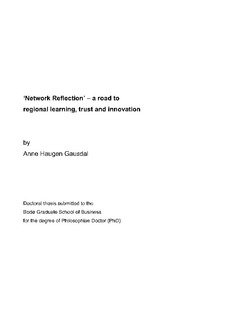| dc.description.abstract | The acknowledgement of innovation as the main driving force in economic development, and the assumptions that networks, regional co-operation and trust contribute to innovation, form the basis of this project. There is a substantial and rapidly growing literature about how regional co-operation and innovative networks work. One should expect this literature to encompass a broad discussion on how to develop appropriate forms of cooperation, but such discussions are relative ly rare. The purpose of the present work is to raise and discuss precisely this issue, i.e. how to develop innovative regional networks in theory and practice.
Universities are challenged to enhance innovation environments and the thesis focuses on mechanisms enacted by a university, such as triggering networking processes within the business community. The research problem is how regional universities may pro mote development of regional networks, and how education of experienced managers may be utilized as a mechanism in this process. The overall research question is: How can
regional forms of co-operation that enhance innovation be developed, and how can the regional universityassist in this development? The three subquestions are: 1) Does network reflection influence the development of regional co-operation and communities of practice? 2) Does network reflection influence regional collective learning and innovation? 3) How can management education contribute to the creation of interpersonal trust in networks?
The empirical context is a cluster of electronics industry in the Norwegian Vestfold region. In 2000, the cluster association decided to set up a joint management programme - in co-operation with the regional university - to improve management practices and increase regional co-operation. To meet this challenge the university developed the educational method network reflection. Network reflection is a pedagogical method for interorganizational, part-time management education, and an intervention with
the purpose of increasing trust and inter-organizational co-operation. This longitudinal case study, with some elements of action research, follows the 27 managers from 14 firms that participated in the network reflection programme, the cluster association and the cluster from 2001 to 2007.
This thesis contains four papers, representing different theoretical perspectives. The main perspectives in the respective papers are: Paper l) cluster, conferences, communities of practice and regional collective learning; Paper 2) innovation, connectivity and communities of practice; Paper 3) innovation, ties, motivation and regional innovation systems; Paper 4) interpersonal trust and trusted weak ties.
This work contributes to the development of theory and methods, and has practical implications. To begin with, it develops new concepts and definitions. Network reflection is a pedagogical method for interorganizational, part-time management education, and as such it constitutes a new concept. It was developed practically during the programme and has been conceptualized theoretically in this thesis. Communities and networks of practice are extended to the regional level and termed regional communities of practice, and the thesis provides a definition of 'regional'. Secondly, the work develops five trust-creating processes: connections, communication, direction, temporary groups and valuable gifts. Thirdly, by combining action research, quantitative social network analysis and qualitative research methods in a longitudinal study, the work provides methodological contributions on how to study the development of regional systems of innovation. Forthly and finally, the work has practical implications for firms, clusters, universities and policy makers.
The answer to the sub-questions is that network reflection has a capacity to increase regional co-operation and influence the development of regional communities of practice. Moreover, network reflection has a capacity to increase regional collective learning and innovation. Finally, network reflection is a system of relationship-building interventions and a social mechanism that influences trust-creating processes. These processes seem to have a capacity to create enduring interpersonal trust and trusted weak ties in networks. The answer to the overall research question is that regional universities may enhance regional forms of co-operation by utilizing network reflection in organizing management education programmes for networks of regional firms. | en_US |
